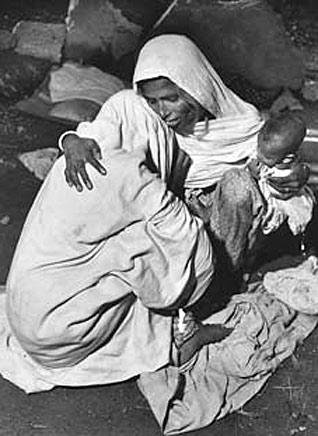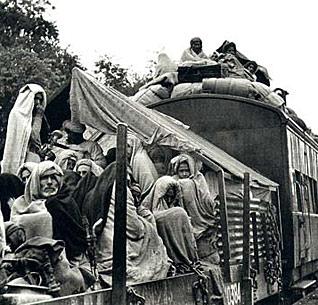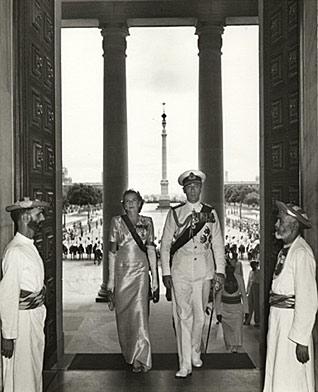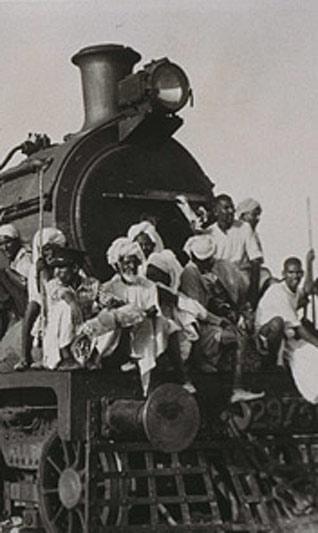Churchill's Idiocy, Gandhi's Blind-spot, Jinnah's Bluff
by DOUG SAUNDERS
Sixty years ago this week, a bespectacled British lawyer named Cyril Radcliffe arrived in India for the first time in his life to take on a simple three-week job. His solitary task, finished on August 13, 1947, would have a few immediate results - hundreds of thousands of people slaughtered, millions mutilated or raped and tens of millions forced out of their homes and livelihoods.
In a larger sense, his little job created the biggest problem in the world today. The recent mosque wars in Pakistan, the nuclear-arms race between India and Pakistan and much of the al-Qaeda threat can be traced to his short stay here.
Radcliffe's job was to draw two lines on a sheet of paper. The lines, across the eastern and western flanks of the soon-to-be-independent nation of India, would attempt to demarcate areas that contained at least 50.1 per cent Muslims from ones that had a majority of Sikhs, Hindus or members of other faiths.
He was, in a coldly bureaucratic way, giving life to the nations of India and Pakistan - an act of partition, or religious segregation, that, only months before, had seemed unpopular and dangerous to the majority of the continent's Muslims and Hindus, and unthinkable to the retreating colonial masters in London.
In India and Pakistan these days, preparations are under way to celebrate the 60th anniversaries of independence, on August 14 and 15. Here, in the Muslim and Hindu neighbourhoods of India's largest city, people tell me they approach the dates with little joy.
"The independence was a great moment for all of us, but we cannot be happy about the way it forced us all to be either Muslims or Hindus, not anything else", shopkeeper Gulzar Bajwar tells me in Bandra, a neighbourhood that was once happily mixed but has become violently segregated since the 1990s, when Hindu extremists drove Muslims out, often shouting at them to "go home to Pakistan".
What happened in 1947 was not just the creation of a new kind of nation. It was the creation of a new kind of people. Suddenly, hundreds of millions of individuals were categorized and forced to define themselves by religion - which had, heretofore, been a largely private and incidental matter for most of the inhabitants of India. People who had no religious belief at all suddenly found themselves defined entirely by a faith they didn't hold.
"What is so strange", the elderly Sikh journalist Narinder Singh Soch told historian Patrick French, "is that we started to see everything in terms of the community to which somebody belonged. Very few of us could avoid that, even though, before the partition, I remember the Sikh-Muslim relationship as being rather good".
This, along with the very similar partition of Palestine done by the United Nations the same summer, represented the creation of the "religious-political individual". In many respects, the twin partitions led to the invention, by Britain and the United Nations, of the designation of "Muslim" as a political category imposed on hundreds of disparate groups with few real common interests - a fiction that meant little before 1947, but has scarred the world since.
Did it have to turn out this way? When people look at India and Pakistan today, as well as at Bangladesh, they tend to imagine that they were the inevitable result of this vast country's ethnic divisions - that Muslims had been seeking their own country and Mr. Radcliffe's line was a cartographic realization of a long-held dream, or at least a tragic but inevitable split between two unhappy partners.
In fact, it was nothing of the sort. The Pakistan decision had profound effects, but few certain or definite causes.
"There was nothing inevitable or pre-planned about the way that partition unfolded", says historian Yasmin Khan, a descendant of Punjabi Muslims who were forced to flee the slaughter of 1947. Her detailed new history, The Great Partition, draws on a decade of scholarship to take a careful look at the feelings and thoughts of ordinary Indians in the event-filled years after the Second World War.
She found that Muslims and Hindus alike had been hungering for independence from Britain, but not ethnic nationhood. Muslims wanted more rights within India, but it was extremely difficult to find any who showed interest, even in the early months of 1947, in having a religiously-segregated nation. Most of those who voted in India's first-ever free elections, in 1946, for the independence-minded Muslim League believed and hoped that they would get more representation within a unified India .
"There were so many things that could have happened, so many possibilities open - so many ways it could have gone", Ms. Khan says. "What they ended up with was a sort of stripping-down, a reduction of everything to labels of religion. That was not at all a certain outcome".
Yet, within months, and against all logic and probability, partition happened. The events of 1947 established a few ground rules that have applied to all future partitions - in Palestine (partitioned that same summer), in the former Yugoslavia (partitioned in the 1990s) and potentially in Iraq.
First, there is no way to draw a clear line between ethnic or religious groups - because they do not really exist as "communities". Therefore, partition will produce lasting violence and conflict (in India's case, even nuclear conflict).
Second, partition cannot be undone, no matter how poor an idea it proves to be. The only case of a partitioned country voluntarily reuniting was the 1707 union of Scotland with Britain, and to this day, it is showing strain, with a separatist government leading Scotland's assembly.
Third, once partition occurs, it is bound to lead to further splits; because divided "ethnic" states are by definition fictions, people inside see the fakery and want to leave. In 1971, the province of East Pakistan - formerly half of Bengal - broke away from Pakistan in an angry Muslim-Muslim war that cost tens of thousands of lives, and became Bangladesh. Residents of Gaza and the West Bank, or Montenegro and Kosovo, will recognize the pattern.
For the 1.4-billion people of the Indian subcontinent, the past six decades have been a struggle to escape this prison of categorization. The current Indian government, with its Sikh prime minister, Muslim president and Hindu cabinet, has made great efforts to overcome the curse of 1947. The current Pakistani government is being torn apart by the effects of its self-definition. In violent uprisings in the north, the east and - as we recently saw in the Red Mosque - the major cities, it is becoming apparent that "Muslim" is not a unifying characteristic at all.
That problem should have been obvious in 1947. In fact, to most people, as Ms. Khan's scholarship has shown, it was.
So, who was to blame for partition, which has been described by several historians as the most destructive single decision of the 20th century?
The most prominent figures of 1947 made some foolish choices that led to countless unnecessary deaths. It has been popular to blame Louis Mountbatten, the final Viceroy of India and the man responsible for its final disposal; or Mohammad Ali Jinnah, the founder of the Muslim League and the father of Pakistan; or even Jawaharlal Nehru, the Congress Party leader who went on to become the first Prime Minister of India.
But by the time those three came along, it would have been very difficult to reverse India's split. Something terrible had happened during the war years.
As recently as the late 1930s, the most likely outcome seemed to be a united India with equal representation of Muslims and Hindus (and seats for Sikhs and others) in the legislature. That was what everyone was fighting for.
Jinnah certainly didn't want a Pakistan - perhaps not even after it happened. A pork-eating, whisky-drinking secularist, the Muslim League leader disdained religious extremism and spent most of his life fighting for equal rights for Muslims in India, not for separation.
"I do not think Jinnah wanted Pakistan", one of his confidantes wrote. "Right till 1946, he was prepared to work for one united India. So all the time he was talking in terms of Pakistan. This was, I always believed, a bargaining point for him". Events then forced him to stick with the Pakistan line; he was likely horrified with the results.
The Congress Party, which has ruled India for most of its history, can take the blame for failing to pick up that bargaining chip. And that failure, oddly enough, can be placed at the feet of Mohandas K. Gandhi, a man who believed with apparent sincerity in an equal union of all religions, but whose actions inadvertently rendered that impossible.
The problem was that Gandhi was not a secular leader: The Mahatma was a devout and rather obsessive Hindu mystic, and he fashioned his Congress Party in a distinctly Hindu fashion. Its shape, tone and language ended up defying his principles, to tragic effect. "By his use of Hinduism as a political tool", the historian Mr. French concluded in a 1997 book, "Gandhi unwittingly opened a Pandora's box that has yet to be closed. ... Gandhi alienated many Muslims, and ultimately helped to bring about the rise in fortunes of the Muslim League".
If Gandhi foreclosed the possibility of a united governing party, it wasn't an irreversible flaw; after the late 1930s, he had little influence over Congress. The fault for allowing the situation to stagnate, for permitting India's harmonious religions to turn into opposing political poles headed for mutual destruction, must lie with Winston Churchill.
It was during the Second World War that partition became inevitable. (Wars tend to do that.) Churchill had the deadly combination of being a radical imperialist who couldn't think of granting India independence, and also a rabid racist who detested Indians. ("I hate Indians. They are a beastly people with a beastly religion".)
He drained India of money: it gave billions of pounds (hundreds of billions in today's figures) to financing the war, and two million Indian soldiers to fight. In exchange, Churchill refused to send wheat to prevent the Bengal Famine, thus sentencing a million people to starvation; he refused to reward those two million soldiers for their sacrifice; and he refused to allow even the slightest democratic rights for Indians. By neglecting the growing divisions in India, the British Prime Minister allowed a passing colonial problem to turn into the biggest crisis of our age.
Churchill's idiocy, Gandhi's blind-spot and Jinnah's dangerous bluff, all added up to a turn of events which, when combined with Radcliffe's line, shaped the world forever.
It was, in the words of the historian Mushirul Hasan, a "man-made catastrophe brought about by cynical and hot-headed politicians who lacked the imagination to resolve their disputes and the foresight to grasp the implications of dividing their country along religious lines".
The best we can hope for now is that we won't repeat the mistake.
[Courtesy: The Globe and Mail]
Conversation about this article
1: Amrik Singh (New Delhi, India), July 21, 2007, 8:51 AM.
So, with all that they did to us - the collective "us", all of us! - and all that the politicians have done to us since, what's there to celebrate this August, the 60th anniversary of the Great Divide? It would do us a lot of good if we had a collective and prolonged moment of silence - for the full 31 days - and did some serious introspection. All of us. Please.
2: Ravinder Singh (Memphis, Tennessee, U.S.A.), July 21, 2007, 11:05 AM.
Awesome article. Opened my eyes to another dimension..
3: I.J. singh (New York, U.S.A.), July 21, 2007, 12:25 PM.
The now much reviled Karl Marx remids us that history comes to us first as tragedy, then as farce. In this, he was so right. Whether in the Indian subcontinent in 1947 or in Iraq in 2007, it is good to remember the foibles and follies of those that govern us, and yet speak as if from divine revelation and purpose. The political honchos would like us to celebrate with jingoism, when our history demands a more sober and purposeful reflection on where we are, how we got there and which way we are headed.
4: Jessi Kaur (California, U.S.A.), July 21, 2007, 12:59 PM.
It is only when events are viewed through the prism of time that truth is separated from propaganda. That time has come vis-a-vis the partition of India. Sixty years later, the biases and myopic visions of Churchill, Gandhi, Jinnah, Nehru - all credited with being great statesmen - are being revealed. The ditties crediting Gandhi's non-violence policies as having brought freedom to India, couldn't be farther from the truth. The vision that tore the country apart on the basis of religion has spread its tentacles in India and continues to raise its ugly head in state-sponsored communal violence ... all for the sake of gaining short-term political advantage. Courageous article!
5: G.C. Singh (U.S.A.), July 21, 2007, 2:57 PM.
The Indian subcontinent was a conglomerate of different princely and feudal states, put together as one country by the British for administrative reasons. It is clear that the Hindu Congress leaders like Nehru, Gandhi and Patel were responsible for the communal virus that has plagued India since the unfortunate scheme of partition which was engineered by the British. Hindu Congress leaders were adamant in refusing to give concessions to Jinnah who wanted iron-clad guarantees for Muslims in any future constitutional setup, since they would be a minority in India. In contrast, the Sikh leaders, who were opposed to the partition of the country, ultimately cast their lot with a purported "secular" India on the basis of express promises of "an area and a set up where [the Sikhs] will enjoy the glow of freedom". The betrayal and treachery by the Congress leaders has cost Sikhs the loss of fertile ancestral lands, historic Sikh Gurdwaras - including the birthplace of Guru Nanak - and caused incalculable death and destruction during the trauma of partition. The events since 1984 have further reinforced the impression that the naive and trusting Sikh leadership committed a historic blunder in 1947, for which generations of Sikhs will have to pay a very heavy price, and have their unique religious, cultural and political identity put in serious jeopardy.
6: Chintan Singh (San Jose, USA), July 23, 2007, 1:29 PM.
The motion picture, Gandhi by Attenborough, is so contrary to this essay. I wonder if ever the majority of the world will find out the real facts behind Partition.






